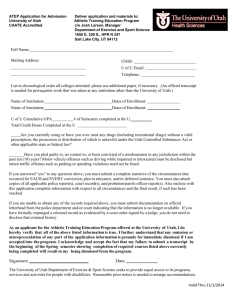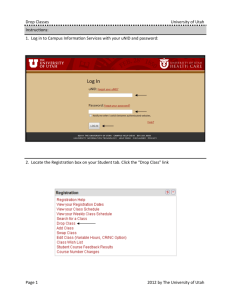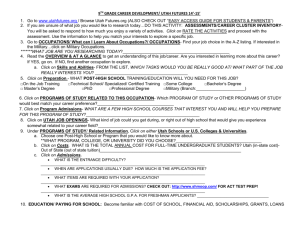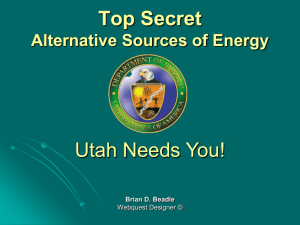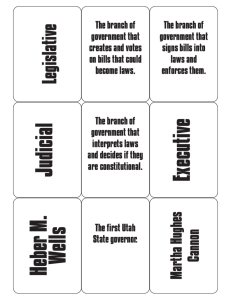Review for Chapter 7
advertisement
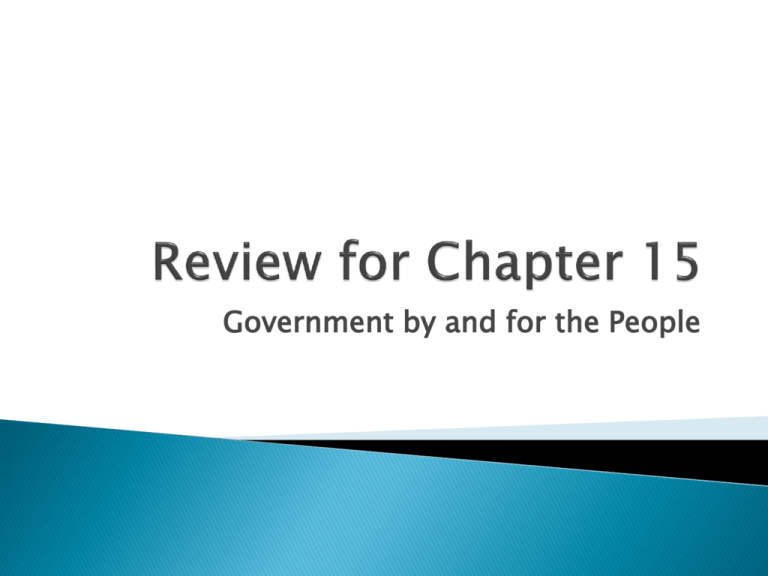
Government by and for the People Class Law 1st Hour Study Guides on Tests Act Free Assignment Act Study Guide Work Day Act 2nd Hour 3rd Hour Less Note Taking Act (clear, sugar free) Soda Act Make Up Work Time Act 4th Hour Music Act Treat Day Act 5th Hour Buddy Review Days 6th Hour Study Guides on Tests Act Listen to Music Act Choose Partners Assignment Freebies Act This is a no gum class. Please dispose of it properly! Make your packet: (Some assignments you may have been turned in already.) Study Guide U.S. and Utah Constitution – Elected Officials (pink) How a bill becomes a law (yellow) The Impact of Congress (pink) Checks and Balances (lined white) Civics (lines paper) *Any other UT Studies papers add to the back of the packet!! Review your packet, especially the essay section! Where should your backpack be? This is a no gum class. Please dispose of it properly! Take out your packet and spend 15 minutes working on the study guide. If you finish early, work on your states map, the essay, and the organizers at the back of the essay. The whole packet is due tomorrow. Where should your backpack be? Essay Questions: All three brainstorms must be completed to get full credit for the essay. #1 What is the role of our #2 What are the differences #3 What are some of the state legislative branch of between the role of the city responsibilities citizens government? government and the role of of Utah and the United the county government? States have? 1st detail 1st detail 1st detail 2nd detail 2nd detail 2nd detail 3rd detail 3rd detail 4th detail 3rd detail History Objective – We will prepare for the exam by reviewing the study guide. Language Objective – We will listen to, give answers and write the important details from the activity. Behavior Objective – Participation & Work Ethic: We will listen to each questions, answer the ones given to us, and write the important details in our notes. 1. Why was it considered treason to write and sign the Declaration of Independence? It was treason because the colonies were still a part of the British Empire and the Declaration said the colonies no longer had to follow Britain. 2. What important document outlines the rules of government for the United States? _____________________ Constitution 3. Why was that document created? To fix the problems the U.S. had under the Articles of Confederation and create a stable government. 4. What do we call those who created the document? (Hint: The book is wrong. They are not called the Founding Fathers.)______________________ _____ Framers 5. In what year was the U.S. Constitution ratified? 1788-89 6. What are the three branches of the US national (and state) government? Legislative, Executive, Judicial 7. What are the first ten amendments to the constitution of the US called? The Bill of Rights 8. When were they (The Bill of Rights) ratified? 1791 9. How does this document preserve the rights of all Americans? The Bill of Rights guarantees that the U.S. government can’t take away certain rights (although it can limit them). If any government in the U.S. passes laws that infringe on these rights, people can challenge them in court (and usually win). 10. Explain the roles and limitations of the levels of government in the U.S.? The National Government, called the federal government, rules everyone in the country. The state government rules only the people in the state. County government applies to smaller regions of the state. City government is government closer to home. 11. Explain the unique relationship between the United States government, the Utah State government, and the tribal government of American Indian nations. American Indians who live on reservations also live under a tribal government. They are separate nations under the national government. Because of this, reservations in states like Utah do not have to obey Utah laws on reservation land. The tribes come up with their own laws. 12. What do Utah’s constitution and the national constitution both start with?____________________ Preamble 13. What are some of our rights as citizens of Utah? Free speech & press Assembly & petition Freedom of religion Fair trial by jury Freedom from excessive bail, fines, cruel punishments Due process of law Habeas corpus Just payment for property taken for public use Freedom from slavery Freedom from unreasonable search and seizure Freedom to bear arms Other rights are given to the people 2) 3) 13. What are some of our responsibilities as citizens of Utah? Respect the opinions of others Pay taxes Vote and help choose good leaders Be tolerant of other religious beliefs Serve on juries when called Support law and order Give evidence in court Assist in preventing crimes and detection of criminals Abide by decisions of the majority Respect rights of the minority Respect public and private property Live peaceably Meet financial obligations Respect the flag and serve the nation when required 14. Describe the responsibilities of the Legislative Branch. The Legislative Branch of Utah makes laws for the state. Duties: Lawmaking responsibilities, Approving Utah government officials appointed by the governor to office (Senate), Holding impeachment trials for government officials accused of a crime, Pass a budget for the state, Taxes levied 15. What two groups make up the state legislature? __________________ and ___________________________ Senate and House of Representatives 16. Describe the nine steps of how a bill becomes a law. 1) 2) 3) 4) 5) 6) 7) 8) 9) Idea drafted into a bill Bill introduced into the House or Senate Committee examines document, recommends or rejects it House or Senate make changes, vote on the bill Amendments adopted by majority vote in committee After committee reviews the bill it is added to the calendar Bill read to House/Senate, debated, then voted on Same process in the other house, then it goes to the governor Governor signs or vetoes the bill, if vetoed a 2/3 majority in the House and Senate is needed to override the veto 17. What can citizens do to influence bills that are moving through the legislature? List three things you can do. 1) Suggest ideas for new laws to legislators 2) Attend public hearings on the bill 3) Call or e-mail representatives about the bill 18. Describe the responsibilities of the Executive Branch. The Executive Branch enforces the laws of Utah. Duties of the Governor: Directing state government, Being commander-in-chief of the Utah National Guard, Signing or vetoing bills, Meeting with the leaders of other state and the president, Developing state policies, Preparing the (proposed) state budget, He or she can also: May present bills to the legislature, May call special sessions of the legislature, Pardons people convicted of crimes 19. Who is Utah’s current governor? ____________________________ Gary Herbert 20. What is the duty of the lieutenant governor? The duties of the lieutenant governor include: Acts as governor when the governor is out of the state Keeps records of the legislature 21. What is the duty of the state treasurer? The state treasurers who directs the spending of state money. 22. What is the duty of the state auditor? The state treasurers who directs the spending of state money. 23. What is the duty of the attorney general? The attorney general who performs legal duties for the governor and other offices. 24. What is the duty of the state boards, departments and commissions? State boards, departments, and commissions look after things like mining safety, agriculture, land use, water, taxes, etc. 25.What are the responsibilities of the Judicial Branch? The Judicial branch interpret the laws of Utah. The duties of the Utah Supreme Court include: Interpreting the Utah Constitution. Applying the laws of Utah according to the Constitution of the Utah. Deciding on the constitutionality of laws passed by the Utah Legislature. Deciding the constitutionality of executive branch actions and policies. The duties of the Utah Judicial system also include: Ensuring the accused of a fair trial. Resolving legal disputes between people, businesses and/or other groups. 26. Utah’s courts handle both civil and criminal cases. What is the difference between civil and criminal cases? In a civil case someone claims they have been harmed by the actions of another person/group, but in a criminal case the defendant is accused of committing a crime. 27. What is the role of a jury? Juries can serve in both civil and criminal cases. Their job is to listen to the lawyers and witnesses then vote on whether they think the person is guilty or innocent/liable or not liable. 28. Who is current head of Utah’s State Supreme Court? ____________________________ MATTHEW B. DURRANT 29. What are the levels of courts in Utah? List them in order of highest to lowest. 1) 2) 3) 4) 5) Utah Supreme Court Court of Appeals District Courts Juvenile Courts Justice Courts 30. What is the role of county governments? What services are provided by the county governments? The main role of county government is to provide state services and record keeping close to your home. These services include: County court, Driver’s license Copy of your birth certificate Marriage license, Pay taxes on a car Hold elections, Levy taxes Carry out laws, Buy property & raise buildings Deal with public health and welfare Business licenses, Schools, Libraries 31. What is the role of city governments? What services are provided by the city governments? The main role of city government is to offer services such as: Build and maintain roads Parks Water Sewage Garbage disposal Snow removal Fire and Police departments Libraries Cemeteries Public programs: 4th of July, recreation programs. 32. What services are paid for with taxes? List ten services that are paid for by taxes. What is local tax money used for? Making and fixing streets. Plowing the snow in winter. Libraries Schools Clean water Garbage collection Recreation like parks, sports, swimming pools, etc. Paying public employees (teachers, police, etc.) Federal taxes? Military protection Currency (money) And many more things 33. Who pays for public education in Utah? Everyone who earns money in Utah and pays their taxes helps pay for public education. 34. What decisions are made by the state government that affect your school? List three things -The number of days students attend school each year -Set the curricula that you study in your classes. (what you learn in class) -How to spend money on books, teachers, technology, aides, buildings etc. -and much more! 35. What can you do to get involved in the political process? List three ways. -Know who your elected officials are. -Visit city council meetings. -Write letters or emails to your representatives. -Volunteer in your community. -Register to vote when you turn 18 and learn about the issues and candidates you will be voting on. -When you are old enough, you can even campaign for a candidate. This is a no gum class. Please dispose of it properly! Take out your study guide and a pencil. Put away everything else under your table. You will be moving so put it where you and others won’t trip on it! Review your packet, especially the states section! (You will not be able to use the study guide on the state test!!) Where should your backpack be? States Test (must be spelled correctly! Alaska Alabama Arizona Arkansas California Colorado Delaware Florida Georgia Hawaii Idaho Illinois Indiana Iowa Kansas Kentucky Louisiana Maryland Michigan Minnesota Mississippi Missouri Montana Nebraska Nevada New Jersey New Mexico New York North Carolina North Dakota Ohio Oklahoma Oregon Pennsylvania South Carolina South Dakota Tennessee Texas Utah Virginia Washington West Virginia Wisconsin Wyoming This is a no gum class. Please dispose of it properly! Pick up your paper and plastic folder from the milk crate at the back. Leave the hanging file!! Take out your study guide and a pencil. Put away everything else under your table. Review your packet, especially the essay section! Where should your backpack be? Things to do: 1. Take Chapter 15 Exam on the iPads. Put away your iPad and pick up an essay paper and your reflection paper. (15 minutes) 2. Go through your folders and pick two assignments you liked/learned the most from this year. Fill out the reflection paper, staple the samples to your reflection and put it in your conference folder. (15 minutes) Go through both folders. Plastic = 3rd trimester; Paper = 1st + 2nd trimesters Please pick two different types of assignments. Don’t just look for assignments that you got a great score on. 3. Put your plastic and paper folders away in the milk crate at the back. 4. Write your essay draft and final. Turn in your essay and study guide to your box. (10minutes) Essay Questions 1. What is the role of our state legislative branch of government? 2. What are the differences between the role of the city government and the role of the county government? 3. What are some of the rights and responsibilities citizens of Utah and the United States have? Bell Activity Review you states, essay, etc.
